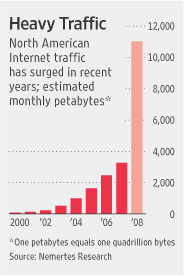What's That Noise?! [Ian Kallen's Weblog]
 Sunday December 14, 2008
Sunday December 14, 2008
OpenEdge vs. Net Neutrality vs. CDN
 The Wall Street Journal reported today that Google Wants Its Own Fast Track on the Web, describing it as an example of the decline of support for net neutrality amongst the The Powers That Be (the usual suspects: Google, Yahoo, Microsoft, Amazon). Plenty of deals have been getting struck anyway between TPTB and data carriers (most prominently AT&T + Yahoo DSL) but outright transit preference doesn't seem to be an issue here. What Google appears to be getting into, called OpenEdge, sounds like an arrangement that amounts to co-locating their gear in the major carrier's datacenters. This would move serving capacity closer to the end-users of their services and thereby accelerate the user experience. Since it doesn't concern transit per se, this actually doesn't sound like a net neutrality issue at all, it sounds like another form of datacenter dispersion.
The Wall Street Journal reported today that Google Wants Its Own Fast Track on the Web, describing it as an example of the decline of support for net neutrality amongst the The Powers That Be (the usual suspects: Google, Yahoo, Microsoft, Amazon). Plenty of deals have been getting struck anyway between TPTB and data carriers (most prominently AT&T + Yahoo DSL) but outright transit preference doesn't seem to be an issue here. What Google appears to be getting into, called OpenEdge, sounds like an arrangement that amounts to co-locating their gear in the major carrier's datacenters. This would move serving capacity closer to the end-users of their services and thereby accelerate the user experience. Since it doesn't concern transit per se, this actually doesn't sound like a net neutrality issue at all, it sounds like another form of datacenter dispersion.
So what exactly is the big deal? All of the TPTB and loads of other online services have content delivery network (CDN) deals. Yahoo, Amazon, Facebook... they all operate or partner with a CDN in some shape or form (full disclosure: I've been working on a CDN evaluation for Technorati). With a CDN, publishers pay specifically to have their content cached at points-of-presence (PoP) around the intertubes that, through some DNS and routing magic, enables web content to get to end-users more quickly. The next step beyond a CDN is to put equipment in the carrier's datacenter. Here's what WSJ said
Google's proposed arrangement with network providers, internally called OpenEdge, would place Google servers directly within the network of the service providers, according to documents reviewed by the Journal. The setup would accelerate Google's service for users. Google has asked the providers it has approached not to talk about the idea, according to people familiar with the plans.It seems perfectly logical, actually.
Asked about OpenEdge, Google said only that other companies such as Yahoo and Microsoft could strike similar deals if they desired. But Google's move, if successful, would give it an advantage available to very few.
Nonetheless, I am concerned about wavering support for net neutrality. Lawrence Lessig, fresh off of his Big News post concerning setting up shop at Harvard Law School, is quoted as saying
There are good reasons to be able to prioritize traffic. If everyone had to pay the same rates for postal service, than you wouldn't be able to differentiate between sending a greeting card to your grandma versus sending an overnight letter to your lawyer.But the counter argument says that there's a big difference. Grandma isn't trying to compete with your attorney (at least, not usually). If the big guys are paying more to be faster, who will be able afford to challenge them? The intertubularly rich will get richer, the poor will be stay poor. The TPTB will ensconce themselves as dynastic media walking on paths paved with gold while all of us commoners walk in the gutter.
The dumb pipes should stay dumb. If an internet service wants to operate out of multiple datacenters, lease dedicated pipes to accelerate their inter-datacenter data distribution and peer with the carrier's PoPs proximate to their datacenters, mazel tov. This can be augmented with CDNs. It can even be taken to the next step by directly installing the carrier's datacenters. But at the network exchanges and pipes connecting them, everyone's packets should remain equal.
UPDATE GigaOM posted about a clarification from Google which says that the WSJ was "confused". The hubbub in that article really was misplaced, it's a CDN deal.
google cdn content delivery network net neutrality wall street journal
( Dec 14 2008, 10:52:25 PM PST ) PermalinkComments [1]



![Validate my RSS feed [Valid RSS]](/images/valid-rss.png)